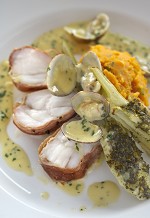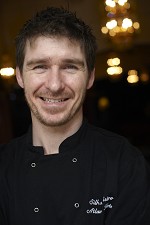 Paul Ainsworth at Number 6 Restaurant, Padstow
Paul Ainsworth at Number 6 Restaurant, Padstow
By the time you read this – and I had to wait until Cornwall Today who commissioned this published it first – they’ll be a long queue forming of diners at Paul Ainsworth’s door. Keen to try his celebratory dessert made up of raspberry curd-filled doughnuts, honeycomb lollipops, chocolate-y peanut popcorn, toffee apples and marshmallow kebabs. A pick and mix pudding, the ‘Taste of the Fairground’, is a clever twist on sweet spoils for kids.
BBC Two’s programme, The Great British Menu, inspired by the Eden Project’s Big Lunch, chose ‘cooking for the people’ for this year’s theme. 24 chefs from across Britain were invited to take part. The brief was to create awe-inspiring food that could be shared in ‘A People’s Banquet’ or the ultimate street party. “It’s all about breaking down barriers, sharing dishes and creating conversation,” explains Mathew Fort, one of the Menu’s three judges alongside Oliver Peyton and Prue Leith.
“I’ve Nathan Outlaw to thank,” Paul explains, “for my taking part. Nathan had taken part in a previous series of the programme and was invited again, however he was too busy so he put me forward.”
Paul’s story, his growing reputation, and his approval by his chef peers should inspire any young school leaver uncertain of their career choice and future.
“My background isn’t one of being inspired through cooking at home. The desire to be a chef happened by chance. Working in the Star Hotel was just one of my work experience options during school. If I’d ended up in the camping shop things might have been very differently,” Paul remarks, “The landlady, Mrs. Brown was a kind of ‘Peggy Mitchell’ character. She saw how keen I was to get a job at 16 and earn some money. I started as a kitchen boy, washing up in a blue boiler suit. Eventually, the chef would let me prep the food a bit, and then I was allowed to make the odd toasted sandwich too. My ultimate thrill was being in charge of a ‘Huntsman’: a steak baguette with mayonnaise. It led me onto catering college.”
Paul built his career through 8 years of working with London’s finest including Gary Rhodes, Gordon Ramsey’s Petrus and Marcus Waring. In 2005 he came to Cornwall to be head chef in Padstow’s ‘Number 6 Restaurant’. “The menu was an ambitious one, aiming towards the fine dining market with expensive and complex menus. We were cooking to impress with amuse-bouches and tasting menus. But”, Paul explains, “in Cornwall this is not really what dinners want. Even if used to eating in places like ‘The Fat Duck’, visitors relish a more relaxed style of dinning when they come to Cornwall.”
When Paul was offered sole leasehold of the restaurant in 2008. He rebranded the restaurant and changed the whole ethos of the menu, “although it can feel like putting your neck on the line,” he remarks, calling it ‘Paul Ainsworth at Number 6’. Offering 3 courses dinner and lunch menus at an affordable set price. “We provide children’s menus to make families feel welcome and we are just as happy when people just want to pop in for coffee and a dessert.”
Paul beat Michelin-starred André Garrett, Head Chef at the Hilton Park Lane Galvin restaurant, and John Hooker from Tavistock in the regional heats, making it to the final eight-chef showdown. Ultimately, it is his ‘Taste of the Fairground’ that triumphs to be paraded down the ancient cobbled streets of Leadenhall Market to grace the tables of 100 expectant guests. The competition required the chefs to think differently, think big, generously and theatrically, as well as gastronomically. It is good to know that ultimately ‘A Taste of the Fairground’ did just that.

 Paul has just opened new venture, ‘Rojano’s’, in keeping with his belief that the only way to cook is with fresh, local, seasonal produce. As a big Italian eatery in the heart of Padstow, it’ll surely ease the popular queue at ‘No.6’.
Paul has just opened new venture, ‘Rojano’s’, in keeping with his belief that the only way to cook is with fresh, local, seasonal produce. As a big Italian eatery in the heart of Padstow, it’ll surely ease the popular queue at ‘No.6’.
For Further information:
6, Middle Street, Padstow,Cornwall,
PL28 8AP
Tel: 01841 532 093
Email: enquiries@number6inpadstow.co.uk
www.number6inpadstow.co.uk


















